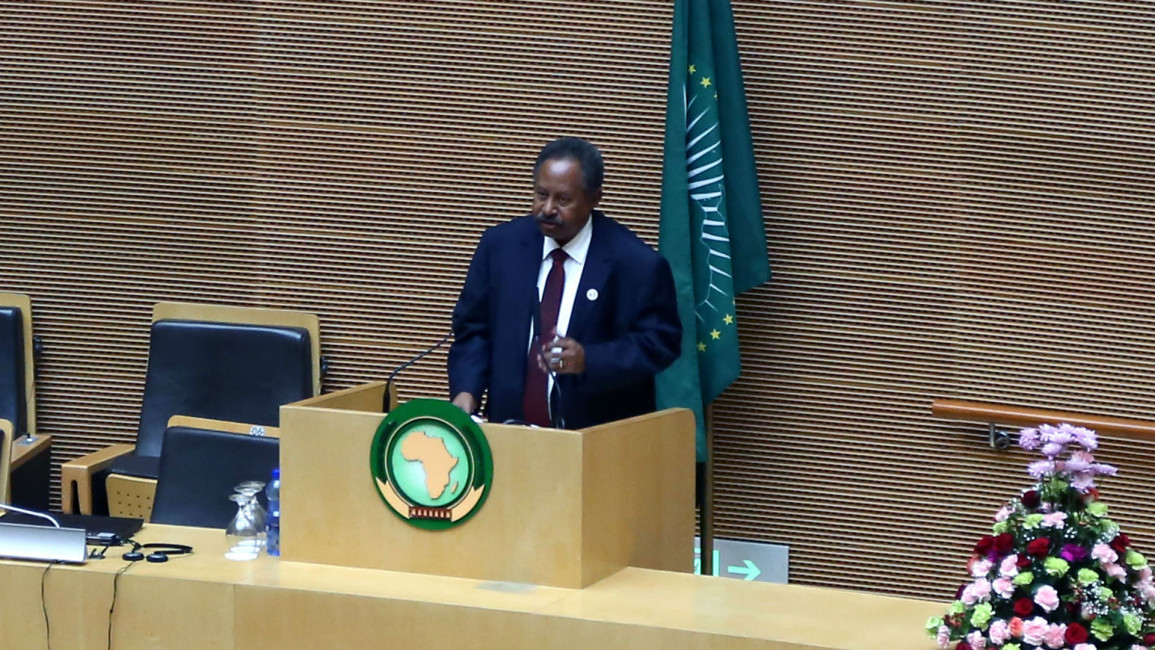REVEALED: Sudan's first post-Bashir cabinet will include four women ministers
REVEALED: Sudan's first post-Bashir cabinet will include four women ministers
Sudan's new Prime Minister Abdalla Hamdok is reportedly due to announce the transitional cabinet on Thursday evening.
4 min read
The new cabinet will reportedly contain four women [Getty]
Sudanese Prime Minister Abdalla Hamdok has come to an agreement with the ruling transitional council over the country's first cabinet since the overthrow of former President Omar al-Bashir.
The cabinet will reportedly feature just four women ministers in contrast with the prime minister's assurances of "gender balance" earlier this week.
The composition of the cabinet is expected to be announced later on Thursday, Mohamed Dia al-Deen told the Sudan Tribune on Wednesday.
Deen is a leading member of the opposition Forces for Freedom and Change (FFC) coalition.
Hamdok on Tuesday met with the joint military-civilian sovereign council to seek formal approval for the composition of the cabinet, Deen said.
After meetings described as tense, the majority-civilian sovereign council sent the prime minister a finalised list of ministers on Wednesday.
Nominations for the eighteen ministries - which have come from the FFC, the military and Hamdok himself - have been contentious.
The cabinet will reportedly feature just four women ministers in contrast with the prime minister's assurances of "gender balance" earlier this week.
The composition of the cabinet is expected to be announced later on Thursday, Mohamed Dia al-Deen told the Sudan Tribune on Wednesday.
Deen is a leading member of the opposition Forces for Freedom and Change (FFC) coalition.
Hamdok on Tuesday met with the joint military-civilian sovereign council to seek formal approval for the composition of the cabinet, Deen said.
After meetings described as tense, the majority-civilian sovereign council sent the prime minister a finalised list of ministers on Wednesday.
Nominations for the eighteen ministries - which have come from the FFC, the military and Hamdok himself - have been contentious.
The military succesfully nominated Lieutenant General Jamal Omar as minister of defence, and the police nominated Idriss al-Taifi as minister of interior, according to the Sudan Tribune.
Omar previously served as a member of the military junta which seized power after overthrowing Bashir in April.
Asma Mohamed Abdallah will reportedly become Sudan's first woman foreign minister.
She was one of the first Sudanese women to serve in the diplomatic corps.
Asma Mohamed Abdallah will reportedly become Sudan's first woman foreign minister.
She was one of the first Sudanese women to serve in the diplomatic corps.
Another three women will reportedly serve as ministers in Sudan's first cabinet since April.
Walaa Essam al-Boushi will serve as minister of youth and sports.
Boushi confirmed the news on Facebook on Wednesday, writing: "My friends, young men and women of the great revolution of Sudan, I would like to inform you officially that we got 'the Ministry of the Revolution' as a friend called it, the Ministry of Youth and Sports."
"The road is not easy, but together we can make and accomplish the impossible as we did in the past months."
Lina al-Sheikh will serve as minister of labour and development and Intisar al-Zein Sghairyoun will become the minister for higher education.
Others reportedly included in the new cabinet are former World Bank economist Ibrahim el-Badawi, who will serve as the new finance minister, and former World Health Organisation official Dr. Akram Ali al-Tom will become minister of health.
Nasr al-Din Abd al-Barri, a lawyer and former researcher at Washington DC's Georgetown University, will serve as justice minister.
Hamdok last week challenged the nomination of leading FFC figure Madani Abbas Madani as minister for cabinet affairs.
While the umbrella group initially stuck to their guns, insisting that Madani serve as the minister, Hamdok was later able to negotiate Madani's future role as minister for industry, according to reports.
|
|
Calls for independent judiciary
Hundreds of protesters gathered in the capital Khartoum, its sister city Omdurman and other locations across the nation on Thursday, responding to calls earlier this week for a "million-man march".
Thursday's demonstrations urged the formation of an independent judiciary, alleging that the country's legal system is still dominated by members of Bashir's regime months after his ouster.
In a video shared on social media, protesters gathered outside the Judicial Authority building in Khartoum chanted: "The people want an independent judiciary."
Activists are calling for Abdelgadir Ahmed to be appointed as head of the judiciary, Radio Dabanga reported.
The military last month blocked the appointments of Ahmed as Chief Justice and fellow FFC-nominee Mohammed al-Hafiz as Attorney General.
Activists are calling for Abdelgadir Ahmed to be appointed as head of the judiciary, Radio Dabanga reported.
The military last month blocked the appointments of Ahmed as Chief Justice and fellow FFC-nominee Mohammed al-Hafiz as Attorney General.
"Since the ousting of Bashir, the Supreme Judicial Council has been fortified with judges loyal to the [military] and the defunct regime, disrupting the restoration of the rule of law and the exposing of corruption," the Democratic Lawyers Alliance said in a statement last month.
"The [military's] refusal to agree on Mohamed Ahmed, proposed by the FFC as head of the judiciary, is a serious blow and a set back from fulfilling an important part of the December Revolution."
Ahmed's appointment has reportedly been blocked due to his insistence on maintaining the rule of law and his urging of the trial of those responsible for the 3 June massacre of more than a hundred peaceful protesters in Khartoum.



